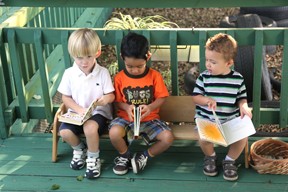Toddler (Age 18 months to 3) Montessori Program
Environment
Toddler communities are designed to meet the developmental needs of the very young child and to support the child’s natural growth. These young students need to move and explore everything in an environment where we can trust that the child will be safe. They are still in the parallel play stage, so while they enjoy being around others, they do not naturally engage in group activities. Toddlers absorb information from sights, sounds, smells, textures and taste without formal lessons. The design of the learning space takes those two factors into account using self-directed, individual activities which can be done with little or no intervention from the adult.
Activities
Hands-on learning materials are placed in sequence throughout our beautiful, spacious classrooms and garden areas to enhance the toddler’s ability to be independent, to use fine and gross motor skills, to recognize sensory impressions, and to increase language and cognitive skills. They use manipulative materials which demonstrate cause and effect relationships and one-to-one correspondence. Children are encouraged to use language to express their needs and to begin to understand others. Engaging developmental art, music and rhythm lessons are also available throughout the day.
The activities of Practical Life encourage the children’s independence in regards to caring for themselves and their surroundings, preparing and serving food, and the lessons of grace and courtesy. The lessons of grace and courtesy are the activities that set Montessori programs apart from that of others. Through the adult example and model, the children learn appropriate, respectful actions and words to use with the people around them.
Everything in the toddler community is a lesson – be it a greeting or changing a diaper. We allow a child to take care of himself as much as he is able. These activities aid the development of concentration, coordination of movement, order, and independence and help to integrate the child’s personality because they develop trust and feelings of self-worth in the child. These activities appeal to children in the sensitive periods of order, imitation, and self-awareness.
Practical life activities also involve toddlers in the care of the environment. Students dust, dry spilled water, and water plants. They also enjoy sweeping, mopping, table washing, table waxing, metal polishing, clothes washing, folding, flower arranging, sowing seeds, and raking leaves. Traditionally, toddlers are not allowed to do these activities for themselves. The key is to scale the activities down and to make it possible for them to care for themselves and their environment independently. The daily maintenance of the toddler community can and should involve the work of the children. They take great delight in this work, especially if it involves water.
Children are involved in all aspects of food preparation and serving, both at snack time and at lunchtime. Food preparation helps foster independence and coordination during these sensitive periods. Activities include self-feeding, use of cup and spoon, setting the table, serving, and cleaning up, as well as pouring water, preparing food, spreading crackers, cutting fruits and vegetables, and washing dishes.
Our toddler communities are prepared so that the child is not controlled, but supported and encouraged, so she has the highest chance of success in order to aid her development.
In our Toddler Community, there is great emphasis on preparing an environment where each child has the ability to move and explore, which supports the development of her self-knowledge. Freedom is given within limits in order for the child to become organized and learn respect for others. The environment is prepared in a way that appeals to the senses through order, balance, and harmony and allows children to follow their natural curiosity and to experiment with the materials.
“Freedom is given within limits in order for the child to become organized and learn respect for others.”
Children have experiences with the natural world through observing and caring for plants and animals in our beautiful garden areas. They learn the importance of safety in using tools, rather than forbidding their use. They engage in developmentally appropriate activities using materials which they can manipulate with their hands, and, along with teachers and parents, they feel a sense of community in which to experience the importance of caring for others.
The activities of Practical Life are designed to develop everyday living skills: caring for yourself, caring for where you live (the environment), preparing and serving food, and the lessons of grace and courtesy (manners and control of movement). Practical Life activities aid the development of concentration, coordination of movement, order, and independence. These activities are important to the integration of the child’s personality because she develops trust and feelings of self-worth.


Recent Comments